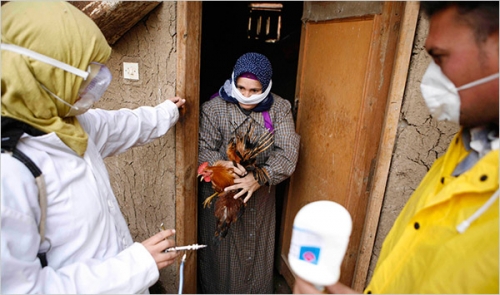An Egyptian woman dies of bird flu

Egypt has reported at least seven cases of bird flu so far in 2014. According to Egyptian health officials, an Egyptian woman aged 19 years who was diagnosed with H5N1 bird flu has died after coming into contact with infected birds. This has been recorded as a second fatality in two days.
Ahmed Abdel – Hamid in southern city of Assiut says that the 19year old woman who raised chickens at home was admitted to hospital on 10th November 2014 and died on Monday the 17th.
Most victims have been women and children who are traditionally tasked with taking care of domestic poultry.
Health ministry official Amr Kandil says the earlier fatality was in June this year and since 2006, there have only been 64 bird flu deaths in Egypt.
Amr Kandil further added that the H5N1 virus is hard to catch and has still remained a threat to Egypt and that most cases of this virus have been linked to contact with poultry.
The World Health Organization warns that whenever bird flu viruses are circulating in poultry, there is a risk of sporadic infections especially in people exposed to infected birds or contaminated environments.
According to data from the World Health Organization (WHO), from 2003 through until October 2, 2014, there have been 668 laboratory-confirmed human cases of H5N1 infection officially reported from 16 countries. Of these cases, 393 have died.
Cases of this H5N1 virus in Egypt have largely been found in impoverished rural areas in the south of the country, where villagers, particularly women, tend to keep and slaughter poultry in the home.
Ahmed Abdel – Hamid in southern city of Assiut says that the 19year old woman who raised chickens at home was admitted to hospital on 10th November 2014 and died on Monday the 17th.
Most victims have been women and children who are traditionally tasked with taking care of domestic poultry.
Health ministry official Amr Kandil says the earlier fatality was in June this year and since 2006, there have only been 64 bird flu deaths in Egypt.
Amr Kandil further added that the H5N1 virus is hard to catch and has still remained a threat to Egypt and that most cases of this virus have been linked to contact with poultry.
The World Health Organization warns that whenever bird flu viruses are circulating in poultry, there is a risk of sporadic infections especially in people exposed to infected birds or contaminated environments.
According to data from the World Health Organization (WHO), from 2003 through until October 2, 2014, there have been 668 laboratory-confirmed human cases of H5N1 infection officially reported from 16 countries. Of these cases, 393 have died.
Cases of this H5N1 virus in Egypt have largely been found in impoverished rural areas in the south of the country, where villagers, particularly women, tend to keep and slaughter poultry in the home.
